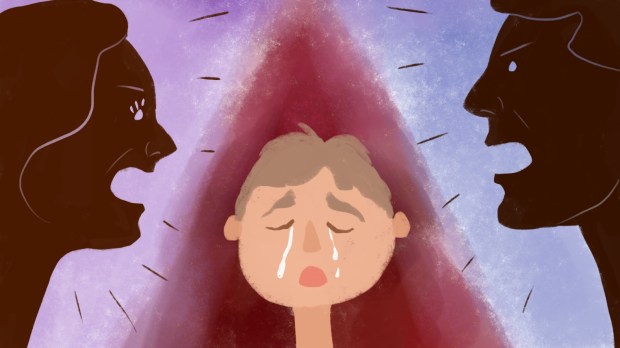There are no marriages without conflicts. However, we ought to take into account what children experience when adults argue. This can inspire us to learn to process disagreements in a way that protects certain boundaries and the needs of other family members.
What do children feel when they witness conflict between their parents?
Loneliness and a sea of helplessness
A 7-year-old boy in therapy wrote on a piece of paper he gave his therapist, “I cry myself to sleep at night. My tears are my only company. I feel lonely. My parents argue at night.”
Loneliness is an overwhelming feeling in such a situation. When adults are drowning in emotions (including aggression), their children have no one to count on. Their parents must maintain emotional balance for them to feel secure, regardless of whether they’re still toddlers or teenagers.
Only calm people who recognize and manage their own feelings can provide a secure foundation for their children to learn that the world is a predictable place. Consequently, when adults go crazy and start yelling and insulting each other, the ceiling, walls, and floor of their children’s inner world collapse.
These children have no one to turn to for support. And they feel fear (for example, that the family will fall apart or that someone will get hurt), anger, and sadness (because their parents don’t seem to love each other). In such a situation, it may seem to them that they’re all alone in the world.
The adults’ burdens become their children’s burdens
Children’s boundaries are violated when content that is not appropriate for a child’s mind reaches their ears. By deciding “whose fault is it” or “who is right,” by talking violently about adult matters, we involve our children in our relationship and its burdens. Whether we like it or not, they begin to carry our unresolved issues as overwhelming baggage.
Children become confidants in our fears over household finances, a witness to our argument over who does more for the household, who cares more about the relationship, and who hurts whom and how much. They may hear words of humiliation or malice. We hear things that are a burden for an adult, let alone a child.
Mom or Dad?
The natural need of children or young people is to be able to love both parents. Arguments force them to choose whom they will agree with and whom they will defend. In doing so, they also feel that they’re betraying one of their parents. Because, after all, they owe loyalty to both Mom and Dad.
It’s a tragic situation when parents drag their children into an argument only so that they will decide whose side is fair. It’s even worse when one parent makes a “pact” with a child against the other parent, explaining why “it’s impossible to live with him/her.” Such damage is emotional abuse and is very grave.
Pushing children’s needs aside
When parents fight, their children feel completely unimportant. And in a way they are right: the parents are invalidating their children’s emotions, without caring what feelings it causes them.
In a home full of conflicts, there is little room for the needs of children. They will begin to push their own needs into the background. They may also feel guilty that Mom and Dad don’t get along. They might begin to think that perhaps if they had been better behaved, studied better, or eaten more willingly, their parents would have been happier.
In homes where fights between parents are the order of the day, children can also suffer from psychosomatic illnesses. After all, they carry an enormous burden of stress in their bodies. Like it or not, they also become informal peacekeepers. They may think they can do something to avoid an argument, such as joking around, distracting their parents, or acting as peacemakers. They are ready to calm even the smallest harbingers of conflict.
Moreover, this fear of conflict sometimes becomes a permanent part of their inner world. They’ve known the worst sides of their parents, not knowing that two people can be different and still be able to talk to each other calmly.
Child welfare vs. the good of the marriage
What does this mean for us as parents? First, it’s an invitation to save adult conversations for when your children are not around. But it’s also a call to solve problems early, preferably as soon as they arise. Waiting indefinitely can cause them to grow to the size of an iceberg.
It’s often said that the marital relationship should come first, because children need loving parents. But I insist that we must put the good of the children first, giving them the opportunity to have a deep and trusting relationship with adults.
Perhaps then it will be easier for us to find the motivation to live through difficult times in marriage in a way that is capable of saving the fragile psyche of a two-year-old, a seven-year-old, or a teenager.
What if we fail? The most important thing is to apologize and explain that what happened was not the child’s fault. We want everyone in our family to feel important and needed.



